| Abraham Lincoln was the sixteenth President of the United States (1861-1865). He was born on February 12, l809 in a log cabin in Kentucky. When he entered the national limelight he had little experience with politics, and he experienced several failures on the path to the White House. His strength was his great character, which was reflected in his fortitude and strong will to resolve the discord in the Union. Many historians believe his innate wisdom and humanity made him the greatest of all the Presidents. Like Washington, he generated a legend, which is undoubtedly greater for his having been the first President to be assassinated while in office. He was known for his honesty and often wore a stovepipe hat. This six-foot-four-inch President was not an abolitionist; but he regarded slavery as evil.

Lincoln grew up living in the wilderness of Kentucky and Indiana. During his entire life, he had less than one full year of formal education; but thanks to his stepmother, he was taught to read and write and do arithmetic at an early age. In 1830, when Abe was twenty-one, the Lincoln family moved to what is now Decatur, Illinois. There he worked as a laborer on farms and flatboats, and even, for a while, as a store clerk in New Salem, where he became a very popular man.

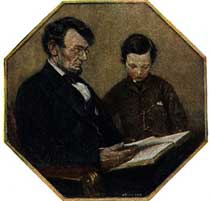 In 1832 Lincoln decided to run for a seat in the Illinois House of Representatives as a member of the Whig Party. He was defeated. In fact, Abraham Lincoln lost more elections than he ever won, but he showed great persistence in overcoming the obstacles that belabored him and never gave up. Soon thereafter In 1832 Lincoln decided to run for a seat in the Illinois House of Representatives as a member of the Whig Party. He was defeated. In fact, Abraham Lincoln lost more elections than he ever won, but he showed great persistence in overcoming the obstacles that belabored him and never gave up. Soon thereafter
he was appointed New Salem's postmaster. In
1834 Lincoln again ran for state office, and this
time he won the election. Abraham Lincoln served
in the Illinois State Legislature (1834-42) and the United States House of Representatives (1847-49). In 1842, while serving as an Illinois legislator, he married Mary Todd.
Lincoln had studied the law and become a licensed attorney. At one point, he traveled extensively and made a name for himself as a frontier lawyer. His way of weaving stories and relating to the common man made him very popular. It was during this time that he became known as "Honest Abe." Lincoln supported the Wilmot Proviso, which proposed that slavery in the United States be prohibited in any territory acquired during the Mexican War (1846-1848). Since the Whig Party had a rule that representatives could serve only one term, Lincoln returned to Springfield to practice law.
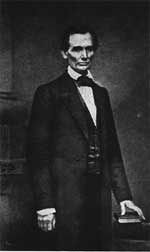 Lincoln's flagging interest in politics was revived in 1854 when Congress passed the Kansas-Nebraska Act, which repealed the dividing line that had been established between free and slave states years earlier by the Missouri Compromise. When Stephen Douglas, a famous orator and Congressman, came to Springfield to defend the bill, Lincoln challenged him. This foreshadowed the famous Lincoln-Douglas debates that were held when Lincoln unsuccessfully challenged Douglas for his Senate seat in 1858. Lincoln's flagging interest in politics was revived in 1854 when Congress passed the Kansas-Nebraska Act, which repealed the dividing line that had been established between free and slave states years earlier by the Missouri Compromise. When Stephen Douglas, a famous orator and Congressman, came to Springfield to defend the bill, Lincoln challenged him. This foreshadowed the famous Lincoln-Douglas debates that were held when Lincoln unsuccessfully challenged Douglas for his Senate seat in 1858.
It was at this point that Lincoln finally joined the Republican Party. His staunch support of the party's anti-slavery position, combined with the national prominence gained in his debates with Douglas gave Lincoln clout with the Republicans. At their convention in Chicago he became their standard bearer and won the nomination for President. In 1860, Lincoln defeated Douglas and another Democratic challenger, although with only forty percent of the popular vote. His cabinet was troubled by internal hatred.

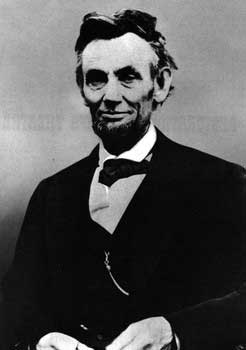 Lincoln was the first President not born in one of the thirteen original colonies. Also, he was the first President from the Republican Party. Prior to his election as President, seven Southern states had seceded from the Union. In his inaugural address on March 4, 1861, Lincoln reached out to the South by telling them he had no intention of changing slavery as it existed; but he held firm to the ideal that the Union be forever preserved and indissoluble. Soon after this, the Southern states banded together in their own Confederate Union. They demanded that the North abandon its garrisons in Southern territories, specifically naming Fort Sumter in Charleston, South Carolina, since it held strategic importance at the harbor to the city. That set the stage for the attack on the fort that became the first hostile act in the Civil War. Lincoln ordered supplies sent by sea to support Fort Sumter, but within two days the Confederates began their siege of the fort, and it surrendered. Lincoln was the first President not born in one of the thirteen original colonies. Also, he was the first President from the Republican Party. Prior to his election as President, seven Southern states had seceded from the Union. In his inaugural address on March 4, 1861, Lincoln reached out to the South by telling them he had no intention of changing slavery as it existed; but he held firm to the ideal that the Union be forever preserved and indissoluble. Soon after this, the Southern states banded together in their own Confederate Union. They demanded that the North abandon its garrisons in Southern territories, specifically naming Fort Sumter in Charleston, South Carolina, since it held strategic importance at the harbor to the city. That set the stage for the attack on the fort that became the first hostile act in the Civil War. Lincoln ordered supplies sent by sea to support Fort Sumter, but within two days the Confederates began their siege of the fort, and it surrendered.
The border between North and South was drawn. Kentucky, Missouri, and Maryland remained in the Union, while Virginia, North Carolina, Tennessee, and Arkansas joined the Confederacy. Lincoln called upon the Union states to send 75,000 militiamen, and he established a blockade of all Confederate ports.
In leading the Union through the Civil War, Lincoln took powers no previous President had ever assumed. He did not wait until Congress approved expenditures, and he suspended the writ of habeas corpus, which allowed that a person could not be imprisoned indefinitely before being charged with specific crimes. He expected a swift battle or two and a quick end to the war, but realized he was wrong after the Battle of Bull Run in Virginia, where the Confederates trounced Union Army. The struggle for the heart and soul of a nation would weigh heavily on the shoulders of this Commander and Chief.
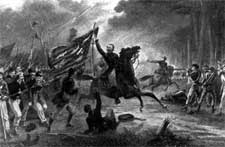 In September of 1862 the Union Army won a small victory at Antietam in Maryland. Lincoln used this event to make one of his most important decisions. He issued the Emancipation Proclamation, which admonished slaves residing in rebellious states "be then, henceforward and forever free." This would become effective January 1, 1863. The Emancipation Proclamation was aimed only at those states at war with the Union, and did not effect slave-holding border states that did not join the Confederacy. More than an attempt to free the slaves, it was an attempt to re-join the country. The Proclamation was an important factor in turning the tide of the war. Not only did freeing the slaves deprive the South of manpower, but in the neighborhood of 186,000 former slaves joined the Union Army. Additionally, it changed the European's perspective on the War from being about politics to being about principle. The northern defeats had tempted Britain and France to recognize the Confederacy; but the Proclamation made them reconsider. In September of 1862 the Union Army won a small victory at Antietam in Maryland. Lincoln used this event to make one of his most important decisions. He issued the Emancipation Proclamation, which admonished slaves residing in rebellious states "be then, henceforward and forever free." This would become effective January 1, 1863. The Emancipation Proclamation was aimed only at those states at war with the Union, and did not effect slave-holding border states that did not join the Confederacy. More than an attempt to free the slaves, it was an attempt to re-join the country. The Proclamation was an important factor in turning the tide of the war. Not only did freeing the slaves deprive the South of manpower, but in the neighborhood of 186,000 former slaves joined the Union Army. Additionally, it changed the European's perspective on the War from being about politics to being about principle. The northern defeats had tempted Britain and France to recognize the Confederacy; but the Proclamation made them reconsider.
After the Proclamation it continued to be an uphill battle for Lincoln, and the North lost many key battles. General Robert Lee, the commander of the Confederate Army, began a push into Pennsylvania to meet the Union in battle at Gettysburg. Lincoln had appointed General George Mead to defend the North. In early July 1863 the two armies met. More losses were sustained in that battle than in all the previous American wars together; but the North held the ground and won the day. July 5, 1863 was a banner day for the North, for on that day word came that General Ulysses Grant had also captured Vicksburg, a key Confederate position on the Mississippi River. On November 19, 1863 the Gettysburg battleground became a military cemetery. Lincoln delivered his famous Gettysburg Address, which spoke of preserving a "nation conceived in liberty, and dedicated to the proposition that all men are created equal."
In 1864, Lincoln named Grant Commander in chief of all the Union Armies. The strategy was bold. In lieu of attacking major Southern cities, Grant decided to attack the principal Southern Armies. It proved to be successful. The war, however, was expensive and in order to pay for it, the North had to raise tariffs, and the federal government started to print paper money. The National Banking Act of 1863 made it possible to sell government bonds. As the tide of the War began to turn in favor of the North, Lincoln started to plan for Reconstruction. His ideas were controversial, and some felt they did not punish the South enough. Nevertheless, with Andrew Johnson of Tennessee as his Vice Presidential running mate, he won a second term with ease.
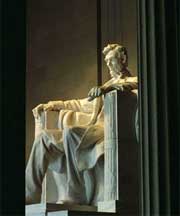 Lincoln's second inaugural address was conciliatory and spoke of the soon to be peace and the ending of national differences. In his second inaugural speech, he said "with malice toward none; with charity for all." On April 9, 1865, General Lee surrendered his Army to General Grant at the Appomatox Court House in Virginia, officially ending the war. Only five days later on April 14, 1865, Lincoln was assassinated at Ford's Theatre in Washington, DC. while attending a play with his wife. At approximately 10:30 John Wilkes Booth, an actor (who was a Southern rebel), made his way into the President's box and shot him in the head at point blank range. Booth jumped onto the stage, injuring himself, but managed to escape. He was tracked down and killed twelve days later. Lincoln's second inaugural address was conciliatory and spoke of the soon to be peace and the ending of national differences. In his second inaugural speech, he said "with malice toward none; with charity for all." On April 9, 1865, General Lee surrendered his Army to General Grant at the Appomatox Court House in Virginia, officially ending the war. Only five days later on April 14, 1865, Lincoln was assassinated at Ford's Theatre in Washington, DC. while attending a play with his wife. At approximately 10:30 John Wilkes Booth, an actor (who was a Southern rebel), made his way into the President's box and shot him in the head at point blank range. Booth jumped onto the stage, injuring himself, but managed to escape. He was tracked down and killed twelve days later.
Lincoln was taken to the house across the street where he died the next day without regaining consciousness. It was a sad event for the North, but also for the South, who had, in Lincoln, a peacemaker. Abraham Lincoln was laid in state, given a military funeral in Washington, and then his body was sent by train back to Springfield, Illinois for burial. Thousands lined the tracks to pay their last respects as the Lincoln Train passed by. Abraham Lincoln was the first President of the United States ever to be killed by an assassin.
 Nicknamed "Illinois Rail-Splitter;" he was admired for the political moderation that allowed him to preserve the nation. On the third Monday in February, known as Presidents' Day, Lincoln, along with George Washington, is celebrated. Abraham Lincoln is one of the Presidents whose images have been carved into Mount Rushmore. His portrait is on the five-dollar bill. Nicknamed "Illinois Rail-Splitter;" he was admired for the political moderation that allowed him to preserve the nation. On the third Monday in February, known as Presidents' Day, Lincoln, along with George Washington, is celebrated. Abraham Lincoln is one of the Presidents whose images have been carved into Mount Rushmore. His portrait is on the five-dollar bill.
|

